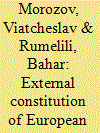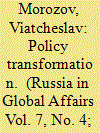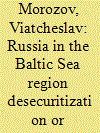| Srl | Item |
| 1 |
ID:
112409


|
|
|
|
|
| Publication |
2012.
|
| Summary/Abstract |
The view of identities as always situated in a relationship with the Other underlies contemporary constructivist social theory. Taking a step further, and combining constructivist approaches to identity with insights from post-colonial studies, this article argues that the Other, far from being a mere presence, often plays an active role in identity politics. By tracing the historically varying ways in which Turkey and Russia have engaged in European identity construction, it demonstrates that this is an interactive process of negotiation between the European Self and its external Others in which agency of the Other is revealed. In particular, Russia and Turkey exercise agency by challenging, each in its own manner, the EU's power to define the normative meaning of Europe. While Turkey has contributed to a decentring of European identity by challenging the self-perception of Europe as a multicultural space, Russia's uncompromising stance tends to consolidate the EU-centred image of Europe as a political community based on liberal democratic values.
|
|
|
|
|
|
|
|
|
|
|
|
|
|
|
|
| 2 |
ID:
124081


|
|
|
|
|
| Publication |
2013.
|
| Summary/Abstract |
An important recent development in the discipline of International Relations (IR) has been the growing interest in the national schools and "non-core" theorizing. Even though this interest is fully justified, we argue that the tendency to describe all such schools as invariably promising and helpful in overcoming the Eurocentrism of the discipline is misguided. It originates in the false assumption that the infinite diversity of collective experiences throughout the world can only be approached on the basis of epistemological pluralism. We explore the confusion between the ontological and epistemological aspects of the problem by looking at the state of international studies in Russia. The development of Russian IR is defined by a controversy between pro-Western transitological approaches and the dominant relativist position centered around the doctrine of multipolarity. The latter is translated into the epistemological domain, leading to a totally counterproductive assertion that "Western" science is unable to understand Russia's specificity.
|
|
|
|
|
|
|
|
|
|
|
|
|
|
|
|
| 3 |
ID:
110462


|
|
|
|
|
| Publication |
2011.
|
| Summary/Abstract |
The bankruptcy of transitology does not rule out the fact that modern liberal democracy is a product of European civilization and, consequently, that it is based on the historical and intellectual experience of the Enlightenment and subsequent eras. This concrete and essential component of the notion of democracy remains the last line in democracy's defense against relativism - it allows us to distinguish genuine democracy from all kinds of fakes.
|
|
|
|
|
|
|
|
|
|
|
|
|
|
|
|
| 4 |
ID:
107436


|
|
|
|
|
| Publication |
2011.
|
| Summary/Abstract |
The article examines the main approaches to multilateralism that coexist nn Russian foreign policy thinking. It argues that these approaches must be put in the context of the debate on multipolarity, which comes out as a direct opposition to the Western "collective unilateralism." Both as an abstract model and as a concrete practice, multipolarity is not synonymous with multilateralism; certain visions of a multipolar world, such as great-power management, are hardly compatible with multilateralism if the latter is grounded in the idea of equality of all participants in the international system. It is also crucial to take in to account the origins of the Russian doctrine of multipolarity in the particular context of Russia's uneasy relationship with the West. Against this background, it is clear that some traditional foreign policy strategies, such as balance of power, can result in both unilateralist and multilateralist outcomes. The article's main conclusion is that the contradictory dynamics of identity and security, in Russia and in the West, seem to produce a trend in favor of great-power management as the model of future international order. If this is true, it means that there is a move toward a type of international society where egalitarian multilateralism is replaced by a more hierarchical structure.
|
|
|
|
|
|
|
|
|
|
|
|
|
|
|
|
| 5 |
ID:
134553


|
|
|
|
|
| Summary/Abstract |
As long as the fundamental restructuring of the global system is not reflected in people’s outlook (and this will take decades), the vacuum in the inner sanctum of Russian national consciousness will continue to be filled by the West.
|
|
|
|
|
|
|
|
|
|
|
|
|
|
|
|
| 6 |
ID:
093171


|
|
|
| 7 |
ID:
054389


|
|
|